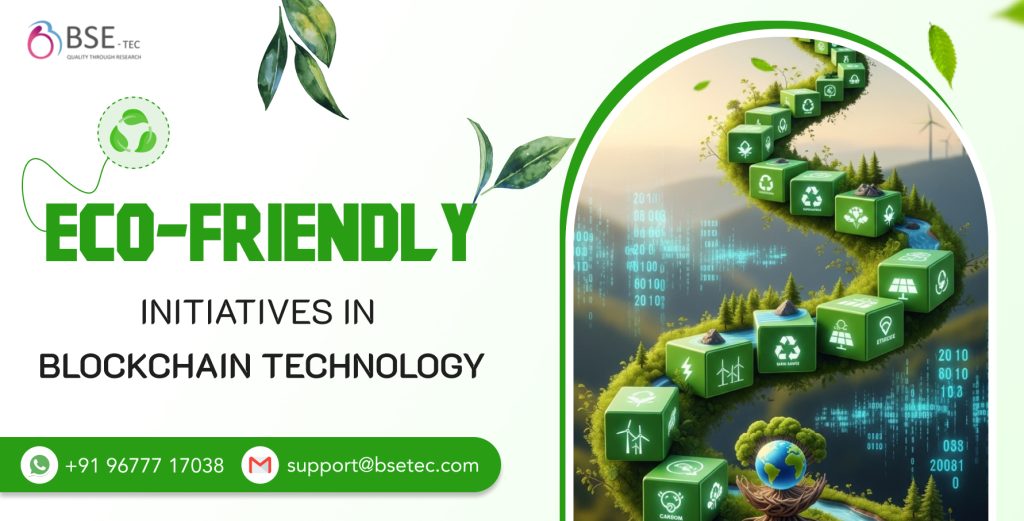
The growth of blockchain technology has transformed various industries. As sustainability becomes a global priority, the blockchain ecosystem is adopting eco-friendly practices to reduce carbon footprints and promote energy efficiency.
Today, the industry is pivoting toward eco-conscious innovation, embracing energy-efficient consensus models like proof-of-stake, renewable-powered networks, and carbon-neutral blockchain protocols. Beyond reducing environmental impact, blockchain is now a tool for transparent carbon tracking, sustainable supply chains, and incentivizing green behavior.
This evolution marks a powerful trend where cutting-edge technology meets environmental responsibility, proving that the future of blockchain can be both revolutionary and sustainable.
What is blockchain technology?
Blockchain technology is a method of storing and sharing data across a network of computers, ensuring the information is secure, transparent, and nearly impossible to alter. You can think of it as a digital ledger where each transaction or record is grouped into “blocks” that are linked together in a chronological chain. Each block is verified by multiple participants, which makes the system trustworthy without the need for a central authority.
While blockchain is widely recognized for powering cryptocurrencies like Bitcoin, it is also being applied in various fields, including supply chains, healthcare, finance, and even voting, where secure and transparent record-keeping is essential.
How is blockchain eco-friendly?
Blockchain technology is evolving fast, and the latest trend is a clear focus on sustainability and green innovation. Traditional networks that relied on energy-intensive Proof-of-Work are being replaced by Proof-of-Stake, Proof-of-Authority, and other energy-efficient consensus mechanisms, reducing electricity consumption by up to 99% in some cases.
The advanced trend is moving toward “blockchain as a sustainability enabler”, where decentralization, transparency, and innovation combine to solve real-world environmental challenges.
This positions blockchain not only as a technological breakthrough but also as a catalyst for a greener digital economy, proving that cutting-edge innovation and eco-responsibility can go hand in hand.
What are eco-friendly initiatives in blockchain?
Blockchain technology, while revolutionary, has faced criticism for its environmental impact, especially with energy-intensive proof-of-work (PoW) networks like Bitcoin. However, the industry is increasingly shifting towards sustainability.
Eco-friendly initiatives in blockchain aim to reduce carbon emissions, optimize energy usage, and create a balance between technological growth and environmental responsibility. These efforts highlight that innovation and ecological awareness can coexist.
Key initiatives
- Proof of Stake (PoS) and Other Low-Energy Consensus Mechanisms
Traditional PoW blockchains require miners to solve complex mathematical problems, consuming vast amounts of electricity. PoS, delegated proof-of-stake (DPoS), and proof-of-authority (PoA) use validation methods that require minimal computational power, drastically lowering energy consumption.
- Carbon Offsetting and Green Initiatives
Many blockchain projects actively offset their carbon footprint by investing in renewable energy projects, tree-planting initiatives, or purchasing carbon credits. This ensures that blockchain operations are closer to being carbon-neutral.
- Energy-Efficient Mining Hardware
Innovations in mining equipment, such as energy-efficient ASICs and GPUs, have reduced electricity requirements per transaction. Some mining operations are relocating to regions with abundant renewable energy, like solar or hydropower, further decreasing environmental impact.
- Sustainable NFT and Token Platforms
The NFT boom raised concerns about energy usage. Eco-friendly NFT platforms now implement PoS networks, batch minting, and carbon-offset programs to make digital collectibles more sustainable.
- Optimized Smart Contract Design
Developers are creating smart contracts with optimized code to reduce computational overhead, which indirectly lowers the energy needed for transaction verification and execution.
- Integration with Renewable Energy
Blockchain projects are increasingly powered directly by renewable energy sources, including solar farms and wind turbines. This approach not only makes mining greener but also encourages investment in sustainable infrastructure.
- Decentralized Environmental Projects
Beyond reducing energy usage, blockchain is being used to track and incentivize green practices, like verifying carbon credits, monitoring supply chains for sustainable sourcing, or supporting decentralized renewable energy trading.
Future of blockchain technology
The future of blockchain technology is bright and transformative. Beyond cryptocurrencies, it promises to make industries like finance, supply chains, and healthcare more transparent, secure, and efficient.
With smart contracts, decentralized applications, and integration with AI and IoT, blockchain could redefine how we manage data, identity, and digital interactions.
Challenges like scalability and energy use remain, but innovations like eco-friendly consensus methods are paving the way. Ultimately, blockchain is set to create a more decentralized, trustworthy, and connected world.
BSEtec’s Role in Eco-friendly Blockchain Initiatives
At BSEtec, we are committed to advancing sustainable blockchain technologies that reduce environmental impact while enhancing operational efficiency.
We see blockchain not just as a technology but as a duty to create an eco-friendly and sustainable digital ecosystem.
Our platforms and applications-from DeFi to NFTs-are built to be scalable and environmentally friendly.
For us, adopting eco-friendly blockchain practices is more than just a trend; it shows our dedication to building an innovative and environmentally responsible digital future.
Our approach focuses on
Adopting Energy-Efficient Consensus Mechanisms: We implement Proof-of-Stake (PoS) and Delegated Proof-of-Stake (DPoS) protocols, which significantly lower energy consumption compared to traditional Proof-of-Work systems.
Leveraging Renewable Energy Sources: Our blockchain solutions are designed to integrate with renewable energy sources, minimizing carbon footprints and promoting environmental sustainability.
Optimizing Blockchain Operations: Through smart contract automation and decentralized applications (dApps), we streamline processes, reducing the need for energy-intensive intermediaries.
Promoting Transparency and Accountability: We utilize blockchain’s inherent transparency to enhance traceability in supply chains, ensuring ethical sourcing and reducing waste.
By implementing these eco-friendly practices, BSEtec not only supports a healthier planet but also helps businesses comply with environmental regulations, improve their brand reputation, and reduce operational costs.
Greener blockchain, brighter digital future.


